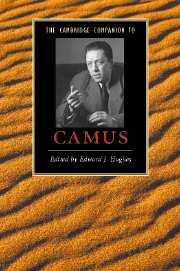Book contents
- Frontmatter
- Introduction
- PART I: BIOGRAPHY AND INFLUENCES
- PART II: THEMES, PREOCCUPATIONS AND GENRES
- 4 Rethinking the Absurd: Le Mythe de Sisyph
- 5 Camus and the theatre
- 6 Camus the journalist
- 7 Camus and social justice
- 8 Violence and ethics in Camus
- 9 Camus and Sartre: the great quarrel
- 10 Portraits of women, visions of Algeria
- PART III: TEXTS AND CONTEXTS
- Postface
- Guide to Further reading
- Index
- Series List
5 - Camus and the theatre
from PART II: - THEMES, PREOCCUPATIONS AND GENRES
Published online by Cambridge University Press: 28 September 2007
- Frontmatter
- Introduction
- PART I: BIOGRAPHY AND INFLUENCES
- PART II: THEMES, PREOCCUPATIONS AND GENRES
- 4 Rethinking the Absurd: Le Mythe de Sisyph
- 5 Camus and the theatre
- 6 Camus the journalist
- 7 Camus and social justice
- 8 Violence and ethics in Camus
- 9 Camus and Sartre: the great quarrel
- 10 Portraits of women, visions of Algeria
- PART III: TEXTS AND CONTEXTS
- Postface
- Guide to Further reading
- Index
- Series List
Summary
Although Camus's essays and prose fiction had a profound impact on the post-war generation in France and elsewhere, this is less true of his theatrical works, which had mixed success during the author's lifetime. His second play, Le Malentendu, in which the returning, unidentified adult son is murdered by his mother and sister, had a difficult reception in 1944. Caligula, Camus's earliest play, was more successful in 1945, seeming to chime with audiences who had undergone the horrors of Nazi occupation, and it ran for almost a year. L'Etat de siège, a collaboration with Jean-Louis Barrault, closed after only seventeen performances in 1948 and has rarely been staged since, but Les Justes was well-received in 1949, running for over 400 performances. Although Camus wrote no more plays, he continued his lifelong involvement with the theatre, producing six adaptations which he helped to stage, and thinking not only of writing a play on Don Juan, but of reworking Le Malentendu and L'Etat de siège. His theatrical works are still produced throughout the world and since the turn of the millennium Les Justes, Caligula and Le Malentendu have been on the London stage. Yet such productions are rare and although articles on single plays have been published and new editions produced, the few book-length studies of the theatre date mainly from the 1960s and 1970s.
- Type
- Chapter
- Information
- The Cambridge Companion to Camus , pp. 67 - 78Publisher: Cambridge University PressPrint publication year: 2007
- 2
- Cited by



